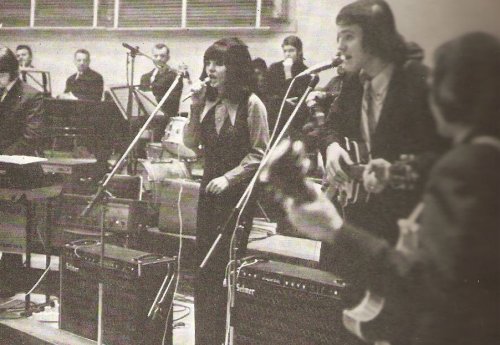I came upon this electrifying Hungarian rock song when I was preparing for this show, on which I played mostly Eastern European music. The video is so exciting that I played it on the air, crappy YouTube audio quality and all. And I would have used that version for Do Your Own Thing, had I not found the mp3 online (on iTunes, no less).

I will reproduce below this post
from the blog Eastern Bloc Songs,
which will tell you all you need to know about the song.
I will only add how continually astonishing it is to think that something as seemingly simple as making rock music, which we take for granted, can be a hard-won right, and even dangerous, in a country that is in the midst of political upheaval and cultural repression.
And that a song of teen rebellion can have deeper political implications.
(And that the Slavic-tinged modal melody fits in beautifully with the more Western-sounding groove laid down by the band.)
Sarolta Zalatnay/Metro Együttes: Mostanában Bármit Teszünk (Qualiton, 1967)
(originally posted 25 January 2012 on Eastern Bloc Songs)
I’ve wanted to include this particular song since a friend first alerted me to its importance in the Hungarian context around two years ago, but that same importance has made it something it seemed crucial to get at least approximately right, and the absence of any workable and reliable gloss from the Hungarian has meant it’s only now that I’ve had an opportunity to make even this tentative attempt at an English version of the lyric. Written by the Belgrade-born but Hungarian-resident brothers Zorán and Dusán Sztevanovity for their group, Metro, in 1967, the song gained prominence when featured in a key film documenting the emerging youth culture of the time, Ezek e Fiatalok (These Young People). The lyric in Hungarian can be transcribed roughly as follows, if my sources are correct:
Mostanában bármit teszünk, egyre több a vágy.
Ki az, akit vádolnak? Ki az, akit vádolnak?
Téged is, ha életkorod nem sokkal a húsz év fölött jár.
Mondd csak, mivel vádolnak? Mondd csak, mivel vádolnak?
Tunik az, hogy korosztályunk másképp él, mint jó apáink,
nem hasonlít mégse rájuk, náluk néha többre vágyik már.
Mostanában bármit teszünk, egyre több a vágy.
Ki az, akit vádolnak? Ki az, akit vádolnak?
Téged is, ha életkorod nem sokkal a húsz év fölött jár.
Mondd csak, mivel vádolnak? Mondd csak, mivel vádolnak?
Vétek az, ha hajunk hosszú,kedves táncunk nem a tangó.
Ki az, akit vádolnak? Ki az, akit vádolnak?
Tánczenénk ha gyors, ha lassú, számukra csak fület bántó zaj.
Mondd csak, mivel vádolnak? Mondd csak, mivel vádolnak?
Évek múlva biztos mi ishallunk ehhez hasonlókat,
egyszer tán a fiaink is így mondják el bánatukat majd.
Coming only a decade after the brutal suppression of the 1956 uprising, the accusatory tone adopted, and the song’s assertion of a basic right to be, well, young, was a potent mix. The studied insolence of the very young Sarolta Zalatnay in this performance is utterly remarkable, every bit as charismatic as her Western contemporaries and predecessors, but it’s the content of the song that seems most forceful. The refrains demanding to have the accusations and charges insinuated by those prone to criticise the young spelled out would have contained a particularly powerful bite in a context where dissidence could still be an arrestable offence in the view of the State, so while on a par with equivalent Western songs similarly asserting the rights of the young, Mostanában is a song that in its own time and place made a stronger statement than the familiarity of some of its sentiments to Western ears would, by themselves, indicate. The song, as performed in Ezek e Fiatalok, can be heard here [or above], and if any Hungarian speaker finds the original lyric transcribed above, or the English version below, to contain errors, please do get in touch: these are all drafts and versions in progress, open to correction.
Mostanában bármit teszünk (These Days, Whatever We Do)
(after Zorán Sztevanovity/Dusán Sztevanovity, 1967)
These days, whatever we do, it seems we want more:
What are we accused of? Who has been accused?
We’re not even twenty, hanging out with our friends:
Tell me, what’s the problem? Tell me, what’s the charge?
Our fathers are another age, we don’t compare, we want more now!
What are we accused of? Who has been accused?
We’re not even twenty, hanging out with our friends:
Tell me, what’s the problem? Tell me, what’s the charge?
We don’t dance the tango, and you think it’s a shame:
What are we accused of? Who has been accused?
Our dancing’s fast, our music hurts your ears:
Tell me, what’s the problem? Tell me, what’s the charge?
I’m sure when we’re older, we’ll dance more slowly ourselves:
What are we accused of? Who has been accused?
That day, our sons will start to complain about us:
Tell me, what’s the problem? Tell me, what’s the charge?
But these days, whatever we do, it seems we want more:
What are we accused of? Who has been accused?
We’re not even twenty, hanging out with our friends:
Tell me, what’s the problem? Tell me, what’s the charge?
What are we accused of? Who has been accused?
Sarolta Zalatnay went on to release ten albums over the years, and worked with some of Hungary's best prog, psych, and funk musicians. Some of those later songs are available on this release.
Do Your Own Thing main pageBusy Doing Nothing with Charlie playlist index
WFMU home page